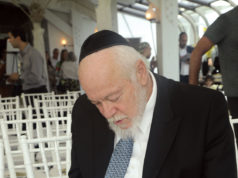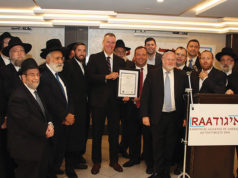 As anti-Israeli sentiments dominate Turkish news reports, historical perspective is necessary. It should not be forgotten that the Ottoman Empire, and particularly its Turkish heartland, were traditionally regarded as relatively safe heavens for Jews fleeing foreign oppression. There are numerous accounts of Sephardic Jews arriving in Constantinople from the Iberian Peninsula and its Inquisitions, but less often recalled are the thousands of refugees who crossed over land from the Balkan area to Trakya, the regional name of European Turkey.
As anti-Israeli sentiments dominate Turkish news reports, historical perspective is necessary. It should not be forgotten that the Ottoman Empire, and particularly its Turkish heartland, were traditionally regarded as relatively safe heavens for Jews fleeing foreign oppression. There are numerous accounts of Sephardic Jews arriving in Constantinople from the Iberian Peninsula and its Inquisitions, but less often recalled are the thousands of refugees who crossed over land from the Balkan area to Trakya, the regional name of European Turkey.
 Today, the Jewish communities of Trakya are mere memories.
Today, the Jewish communities of Trakya are mere memories.
War and Population Movement
Quiet Jewish life in neighboring Bulgaria was disrupted on March 3, 1878, when the Treaty of San Stefano declared a Russian protectorate over the country. Although the protectorate was canceled several months later, damage had already been inflicted. The Russians brought not only their army to Bulgaria. They also brought anti-Semitism, which quickly took hold in the previously tranquil area. Following blood libel, slaughter, and plunder, Bulgarian Jews by the thousands found refuge in the nearby Ottoman Empire. Some returned to Bulgaria as life quieted down in the pseudo-liberalism encouraged by a new constitution, but many others remained in Constantinople and Trakya.
Jews were regarded as loyal citizens of the Ottoman Empire, having been recognized in 1835 as an official community with a chief rabbi, according to protocol on par with Greek Orthodox and Armenian clerics. In the fluid politics of the Empire, being loyal citizens still did not guarantee that the direction of change was in the best Jewish interest. And, change was in the winds.
The Young Turks
Political turmoil erupted in the Ottoman Empire with the Young Turks Revolution of July, 1908. The revolution brought new concepts to the Empire, namely nationalism. Nationalism was sweeping Europe, and it was considered threatening to the Empire. The concept of a nation did not exist. It was religion—namely Islam—that kept the Empire together. There were non-Muslims in the Empire, but they played a secondary role.
The rise of nationalism meant new values—secularism and a resultant shunting of traditional Islam. According to early 20th century philosophy, factors such as national identity and common language overshadowed religion.
Essentially, advocates of nationalism said true Turks were those who spoke Turkish and upheld the Turkish cultural heritage.
Now, in the early 21st century, a new type of nationalism has taken over Turkey, stressing fundamentalist Islamic identity as a unifying factor.
Back in the early 20th century, secular nationalism foreshadowed problems for Turkish Jews. They were no longer granted autonomy or democratic protection. Jewish interests came into conflict with the growing ideal of a newly emerging Turkish nation-state. Turkish language and culture were imposed upon them without the modern pluralist guarantees that protect minorities. Emigration, which started in a trickle at the very beginning of the 20th century, became more attractive to many Jews. At first mostly young, single, male Jews chose to emigrate rather than face obligatory military service.
With the rise of the Young Turks came increased interest in Zionism for Turkish Jews, both within the context of modern nationalism and as a reaction to the emerging trends that would later lead to the establishment of the Republic of Turkey.
Another incentive for Jews to emigrate from Turkey was the educational reform enacted in the years following the Young Turks movement. A 1914 law set a mandatory two month summer vacation in elementary schools. For Jews, this meant no vacation in the Hebrew month of Tishrei, which had previously been their custom.
The following year, matters became worse. It became mandatory for schools to employ Turkish instructors approved by the Empire to teach Turkish language, history and geography. When this regulation was strictly enforced after the declaration of the Republic in 1923, it became clear that no non-Muslim teachers would be approved. Then in 1924 the Unification of Education Law forbade the teaching of religion in many schools.
Few Jews could leave the Ottoman Empire immediately following the Young Turks Revolution. Political tension leading up to the Balkan Wars, World War I, and the Turkish War of Independence meant that only a small number of people were able to emigrate.
Immediately following World War I, the situation changed. Some 10,000 Sephardic Jews left Turkey for the United States.
Leaving the Old Country Behind
For many immigrants, it was not difficult to leave their Turkish cities, since many of the Jews were only recent arrivals to those places. They had no time to establish roots. In Edirne (formally Adrianople), a large part of the Jewish community arrived as refugees following the Berlin Conference of 1878. In 1870, there were between 4,000 and 5,000 Jews in the city. This figure jumped to 15,000 in 1900, then to 28,000 in 1914, as war refugees streamed in.
The refugee population felt no particular attachment to the city. This sense of detachment was reinforced when a fire destroyed large segments of the city in 1903. Personal dwellings and property were lost, and most of the Edirne synagogues were damaged. Economic problems and overcrowding in Edirne also made adjustment of both Jewish and non-Jewish refugees quite difficult.
Edirne is an example of the repeated political and military problems plaguing the area and of a population seeking to migrate, but hampered from moving by wars. Today, only one or two Jewish families remain in Edirne, and the former central synagogue is a shambles.
Turkey and Israel
When Israel and Turkey established diplomatic relations in March 1949, Turkey was essentially flouting its non-Arab secular-Islamic orientation established under the leadership of Mustafa Kemal Atatürk (1881-1938). The current Turkish government is redefining their identification, moving much closer to the fundamentalist Moslem world.
How long will the Jewish community of Istanbul remain thriving? Jews in Trakya are no longer. Izmir has a dwindling community. The future of Jews in Istanbul remains an open question.
______________
Dr. Jay Levinson is retired from the Israeli police. He is a visiting professor at John Jay College of Criminal Justice and a freelance writer concentrating on travel, Jewish history, and archeology.



